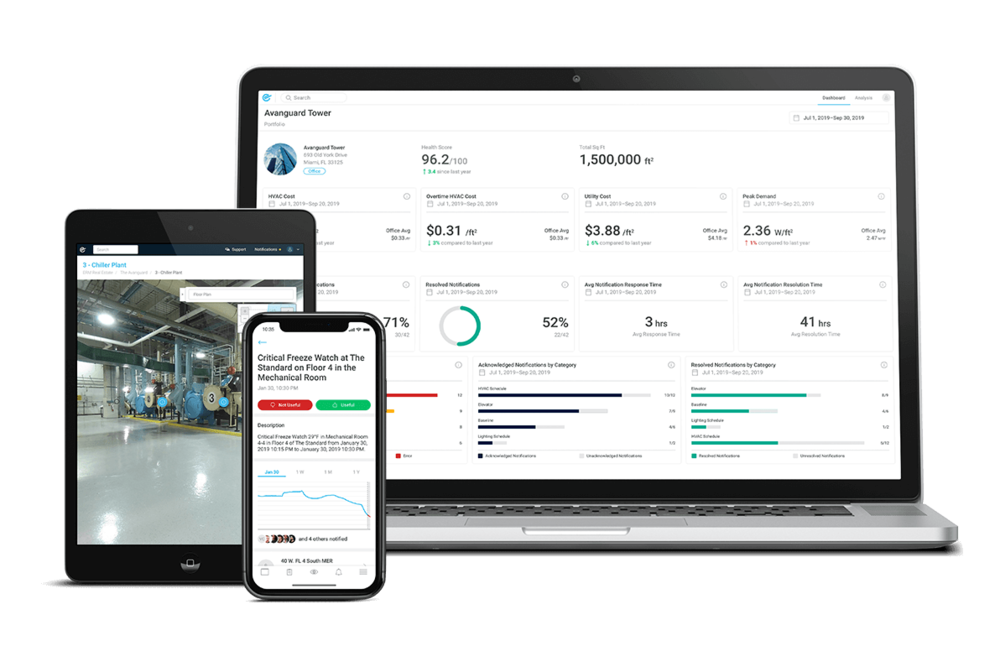The Compounding Value of Technology, Part I: Productivity
This is the first in Enertiv's latest series, The Compounding Value of Technology, where we explore how technology’s value builds on itself, from small productivity gains to ultimately increasing asset value at disposition.
In commercial real estate, every minute wasted on administrative tasks and inefficient data management translates into lost opportunities for serving tenants and maximizing NOI.
Whether it's manually submitting data to Energy Star, performing inspections on clipboards, or slogging through tenant utility bill backs and CAM reconciliations, the relentless search for essential information takes priority over more strategic time investments.
This inefficiency not only drains resources but carries an opportunity cost for higher value activities.
This article explores the cumulative impact of these inefficiencies and offers sample calculations of the value of productivity.
As importantly, it highlights how technology and sets the stage for the higher order value opportunities, from cost avoidance, to unlocking additional capital sources, to positioning assets in a competitive market to sell at a premium.
The Time Sink: Information Entry and Retrieval
Right now, building teams spend 18 percent of their time searching for the information needed to do their jobs – roughly an entire working day every week spent digging for data.
Property managers could be trying to figure out the last time someone spoke with a tenant or who the right tenant contact is.
Engineers may spend hours trying to find equipment warranty info and an anticipated end-of-life date for a critical piece of equipment that’s down as they weigh the decision to repair or replace it.
Portfolio leaders struggle to gather the insights needed to do regional and portfolio-wide analysis and planning for everything from energy performance and carbon credits to capital projects and buy/sell decisions.
Paper Inspections Mean Lengthy Budgeting Seasons
Even sophisticated portfolios continue to rely on paper-based inspections that eventually pile up on desks or in file cabinets.
Engineers and vendors walking around the building with clipboards or notebooks often result in delays in identifying and addressing issues promptly.
The longer it takes to detect problems, the greater the potential for impacts on operating costs and the tenant experience.
When leases expire and tenants move, property managers completing space inspections may be noticing issues for the first time, even after spending hours each year just to track tenant maintenance contracts.
The impacts of this are most acutely felt during budgeting season. On average, it takes two months just to gather all the information needed to present operating and capital budgets for each year.
Basic Energy Management Has Tripped Over Decarbonization
In an age of automation, many portfolios are still manually entering Energy Star data and administering tenant utility billing via spreadsheets.
Typos, miscalculations, and misinterpretations can lead to inaccuracies in bills which not only impact tenant experience but also require additional time and effort to rectify.
The delay required to manually track, share, and manage utility billing can also impact cash flow on a building’s balance sheet each quarter.
All of this data entry and digging adds stress and confusion to strategic, annual activities, which now include putting together decarbonization plans.
Without timely and accurate information, building owners and operators make seven-figure decisions largely based on one person’s opinion at a snapshot in time.
The Cumulative Impact: Time Not Well-Spent
Ultimately, streamlining operations empowers building operators to shift their focus from administrative tasks to adding value to their portfolios.
Manually filing a few inspections each day or updating Energy Star data once a month may seem manageable individually, but when added together, they represent a substantial portion of a building team’s day.
Compounded over a month and a year, the cost of the status quo can be mind boggling.
Take for instance, a few basic workflows:
40 hours per month on work orders
8 hours per month on meter readings and bill generation
5 hours per month on Energy Star submission
52 hours per month on budgeting (for 3 months of the year)
At an all-in cost of $100 per hour (very conservative for some markets), that’s $79,200 spent on these workflows over the course of a year.
Assuming:
10% time savings on work orders (by automating workflow, reporting, etc.)
50% time savings on tenant billing (by automating bill generation and data entry)
100% time savings on Energy Star submission (a process that can be completely automated)
20% time savings on budgeting (by making information easily accessible, tracking conditions and previous decisions)
That’s 207 hours that can be saved, or $20,748.
The other benefit is that digitization creates resilience. As buildings are bought and sold, assets repositioned, new property managers hired, and tenured chief engineers retiring, technology creates continuity and efficiency.
Will this significantly change the cash flow of the property? No.
However, it does generally outweigh the cost of software, and, more importantly, creates the foundation on which much greater value is generated.
Portfolios that invest in digitization and process optimization can deliver premium tenant experiences, catch issues before they escalate, and develop strategies to better position assets.
Creating more efficient, productive workflows for building operations is just the first rung of value that optimizing operations achieves.
The bigger picture signals a revolution in how buildings are run and asset performance that elevates valuations.
Enertiv is proud to call a wide range of owners, operators and investors clients. Check out our case studies to see how technology has delivered value for portfolios like yours.
Enertiv provides original research and insights on how technology is helping leading owners and operators maintain competitiveness in the changing commercial real estate industry.

Enertiv is an all-in-one operations platform fuelled by real-time data and centered around decarbonization for commercial real estate.
Get a tailored demo here






